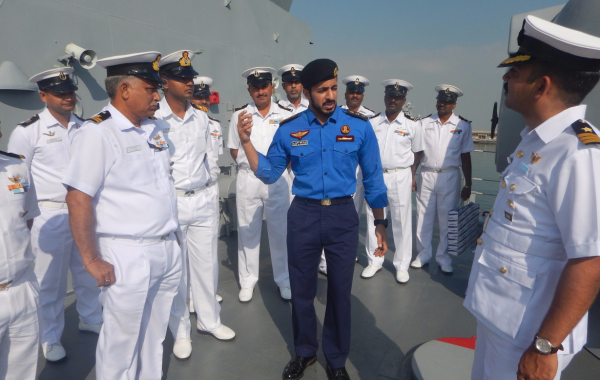Doha, Qatar, October 29: A Qatari court has handed down death sentences to eight former Indian Navy personnel, leaving families in India and officials at the Ministry of External Affairs deeply surprised.
India’s Ministry of External Affairs is currently pursuing legal options and intends to hold discussions with Qatari authorities about the situation. The current situation poses a significant test of the diplomatic skills of the Modi government.
Who are those Eight Veterans?
The eight Indian Navy veterans sentenced to death are Commander Purnendu Tiwari, Commander Sugunakar Pakala, Commander Amit Nagpal, Commander Sanjeev Gupta, Captain Navtej Singh Gill, Captain Birendra Kumar Verma, Captain Saurabh Vasisht, and Sailor Rajesh Gopakumar.
These individuals had distinguished careers in the Indian Navy, some serving for up to 20 years and holding key positions, including instructional roles.
Notably, in 2019, Commander Purnendu Tiwari was honored with the Pravasi Bharatiya Samman, the highest recognition awarded to overseas Indians, for his contributions to enhancing India’s reputation abroad.
All eight Indians were employed by Dahra Global Technologies and Consultancy Services, a private company that offered training and services to Qatar’s armed forces. The company is owned by Khamis al-Ajmi, a retired squadron leader of the Royal Oman Air Force.
Ajmi was arrested alongside the Indian individuals last year but was subsequently released in November 2022.
According to sources, some of the Indians on death row were engaged in a highly sensitive project involving Italian technology-based midget submarines with stealth features. In May, Al Dahra Global ceased its operations in Doha, leading to the return of its predominantly Indian workforce.
Arrest and Charges
The eight veterans were apprehended by Qatar’s intelligence agency on August 30, 2022. To date, neither the Qatari authorities nor New Delhi have publicly disclosed the specific charges against the Indian nationals.
Reportedly, these individuals are facing allegations of espionage. The charges were formally filed against the eight Indian Navy veterans on March 25, and their trial is being conducted in accordance with Qatari law.
Despite making multiple bail requests, their pleas were denied, and the recent verdict was issued by the Court of First Instance in Qatar on Thursday.
Mysteries in the Case
The death sentence handed down by a Qatari court on Thursday to eight Indians reportedly accused of espionage is “deeply shocking”, as the Ministry of External Affairs described in a statement.
The trial was shrouded in secrecy, with scant information on the charges and evidence against the former Indian Navy servicemen, arrested by the Qatari Intelligence agency in August 2022. Despite pleas from their families and Indian diplomats in Doha, Qatar has not explained why it has not divulged details of the case.
Even the judgment has yet to be shared with New Delhi. Leaked reports suggest that the men have been accused of sharing secret information pertaining to the stealth submarine program they worked on, with a third country, a charge their families have denied.
Visits by Indian officials to Qatar to plead for leniency and transparency have been of no avail. While this case has some parallels to the case of former Naval Commander Jadhav, who is on death row in Pakistan, the difference is that India’s ties with Qatar have been relatively better.
India’s response
In response to the verdict, the Ministry of External Affairs expressed its deep shock and stated that it awaits the detailed judgment in the case while actively exploring all available legal options.
The government affirmed its commitment to providing comprehensive consular and legal assistance to the affected Indian individuals, emphasizing the high importance attached to this case. The MEA also indicated that they would address the verdict with Qatari authorities.
Notably, it’s been reported that the families of the former Indian Navy personnel filed a mercy plea with the Emir of Qatar, although this has not been officially confirmed.
The Indian government needs to provide the necessary diplomatic support to the convicted individuals in their appeal. This involves pursuing the legal appeals process, diplomatic efforts, and engaging with the Qatari leadership at the highest levels.
India has strong strategic and defense cooperation agreements with Qatar and sources 40% of its LNG needs from the country. Furthermore, India is one of Qatar’s largest sources of imports, providing raw materials for construction and fresh food items.
This relationship persisted even during the Gulf blockade against Qatar in 2017, demonstrating the importance of their ties.
The situation raises significant concerns not only for the individuals involved but also for the broader bilateral relationship. With approximately 700,000 Indian expatriates contributing to Qatar’s institutions, industry, and workforce, a strain in ties would negatively impact both nations.
A case can be presented for clemency and the potential for serving sentences in India if guilt is determined through the appeals process. Regardless of reports indicating geopolitical factors in this verdict, it is imperative for the Indian government to prioritize the well-being of these individuals, in accordance with its “no Indian left behind” policy.






